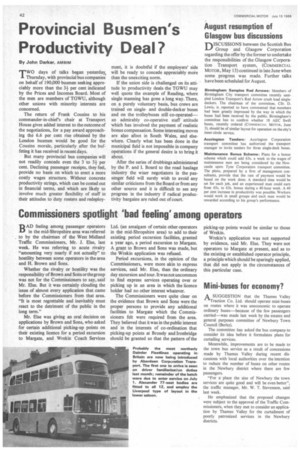Provincial Busmen's Productivity Deal?
Page 44

If you've noticed an error in this article please click here to report it so we can fix it.
By John Darker, AMBIM TWO days of talks began yesterday, Thursday. with provincial bus companies on behalf of 190,000 busmen seeking appreciably more than the 34per cent indicated by the Prices and Incomes Board. Most of the men are members of TGWU, although other unions with minority interests are concerned.
The return of Frank Cousins to his commander-in-chief's chair at Transport House gives added interest to the outcome of the negotiations, for a pay award approaching the 6.6 per cent rise obtained by the London busmen would be good for the Cousins morale, particularly after the buffeting it has received in recent days.
But many provincial bus companies will not readily concede even the 3 to 34per cent. Declining passenger receipts, they feel, provide no basis on which to erect a more costly wages structure. Without concrete productivity strings, which can be costed out in financial terms, and which are likely to involve much greater flexibility of staff in their attitudes to duty rosters and redeploy
ment, it is doubtful if the employers' side will be ready to concede appreciably more than the unexciting norm.
If the union side is challenged on its attitude 'to productivity deals the TGWU may well quote the example of Reading, where single manning has gone a long way. There, on a purely voluntary basis, bus crews are trained on singleand double-decker buses and on the trolleybuses still co-operated— an admirably co-operative staff attitude which has involved the payment of realistic bonus compensation. Some interesting moves are also afoot in South Wales. and elsewhere. Clearly what has been done in the municipal field is not impossible in company operations if the general desire is to bring it about.
After the series of drubbings administered by the P. and I. Board to the road haulage industry the wiser negotiators in the passenger field will surely wish to avoid any similar criticisms from the Board or from any other source and it is difficult to see any progress in the industry if' radical productivity bargains are ruled out of court.
























































































































